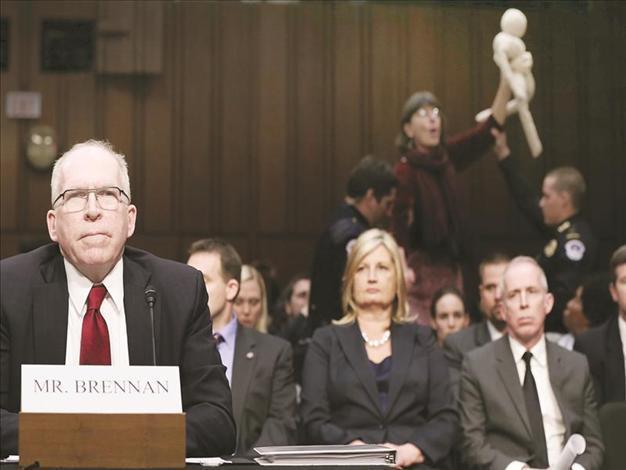CIA director nominee Brennan: Drone strikes used only for major threats
WASHINGTON – The Associated Press

Anti-war protesters disrupt the start of a nomination hearing for U.S. Assistant to the President for Homeland Security and Counterterrorism John Brennan before the Senate Intelligence Committee February 7, 2013 in Washington, DC. Brennan is the nominee to be the next Director of the Central Intelligence Agency. Win McNamee/AFP photo
Nominated to head the CIA, John Brennan said Feb. 7 he did not try to stop waterboarding, an interrogation technique that some consider torture, while firmly defending the controversial drone attacks that have targeted Americans as well as foreigners overseas, as he faced tough congressional questioning on those issues.
Under sometimes-combative questioning from senators, he conceded that after years of intelligence work he is uncertain whether the use of waterboarding in interrogations has yielded valuable information. He declined several times to say whether waterboarding is torture, but he did say it is “something that is reprehensible and should never be done again.”
President Barack Obama’s top anti-terrorism aide, the 57-year-old Brennan won praise from several members of the committee as the day’s proceedings drew to a close, a clear indication that barring an unexpected development, his confirmation as the nation’s next head of the CIA is on track. The panel will meet in closed session next week to permit discussion of classified material.
Brennan is a veteran of more than three decades in intelligence work. Any thought he had of becoming CIA director four years ago vanished amid questions about the role he played at the CIA when the Bush administration approved waterboarding and other forms of “enhanced interrogation” of suspected terrorists.
In a statement read at the beginning of the session, Brennan said the United States remains at war with al-Qaida and other terrorists and is under “daily cyberattack” from foreign countries and others.
Protests interrupt the hearingsThe hearing was interrupted repeatedly - once before it began and then several times before Brennan had completed his preliminary remarks. At one point, Sen. Dianne Feinstein, a Democrat and the panel’s chairman, briefly ordered the proceedings halted and the room cleared so those re-entering could be screened to block obvious protesters.
The shouted protests centered on CIA drone strikes that have killed three American citizens and an unknown number of foreigners overseas.
It was a topic very much on the mind of the committee members who will eventually vote on Brennan’s confirmation.
Sen. Ron Wyden, a Democrat made the drone strikes the main focus of his time to question Brennan, asking at one point what could be done “so that the American people are brought into this debate and have a full understanding of what rules” are for their use.
Brennan said the day’s hearings were part of that effort, and said he backs speeches by officials as a way to explain counter-terrorism programs. He said there is a “misimpression by the American people” who believe drone strikes are aimed at suspects in past attacks. Instead, he said, “we only take such actions as a last resort to save lives” when there is no other alternative in what officials believe is an imminent threat.
Despite the sometimes-combative questioning, Brennan’s confirmation seemed a foregone conclusion as he appeared before the committee. “I look forward to working with you,” said Colorado state Sen. Mark Udall.
Administration officials say Brennan would further limit the use of drones by the CIA and leave the majority of strikes to the military.
The CIA’s drone strikes primarily focus on al-Qaida and Taliban targets in the tribal regions of Pakistan. The agency also carries out strikes in Yemen, where three American citizens with al-Qaida connections were killed: Anwar al-Awlaki, his 16-year-old-son and Samir Khan.
